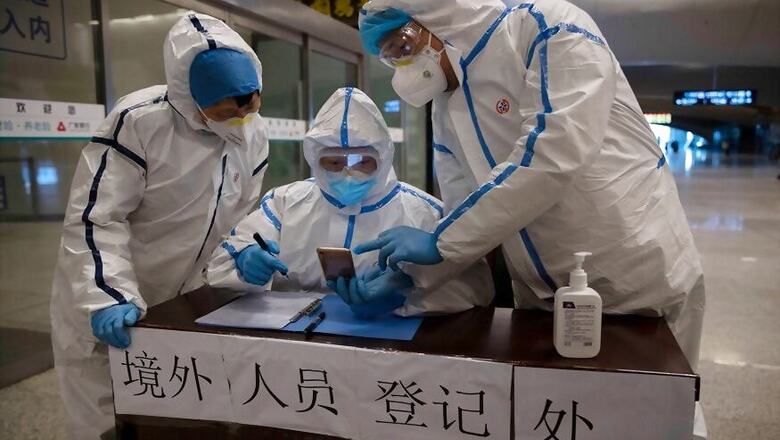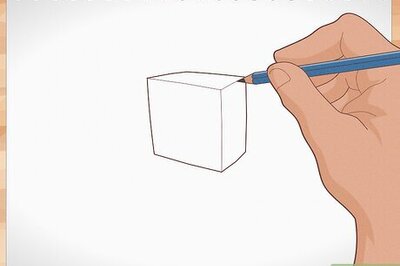
views
The viral video where a senior adviser at the World Health Organization (WHO) abruptly ended an interview on being questioned about Taiwan's role in the organization has had Bloomberg columnist Hal Brands explain China’s manipulation of the world bodies. Looking beyond the video, Brands explains how the country uses global bodies like the World Health Organization as tools to forward its agendas – here being a "diplomatic struggle to isolate and delegitimise a democratic Taiwan".
The Covid-19 crisis has had experts look into China's role in influencing the WHO and other international organisations to expand its footprints by jumping on this humanitarian health crisis.
Senior journalist Chitra Subramanium wrote in ORF - "China colonising public health with WHO’s help?" Imagining the post corona calm, she questioned, "Will the world be more protectionist?
"Will the Geneva-based World Trade Organization (WTO), the world’s free trade police with teeth be China’s next battleground?," she asked.
Just last week Business Insider reported how disenchanted the Conservative MPs in UK are with the way China kept everyone in the dark and in all likeliness lied or downplayed Covid19 deaths in China. They are all for redrawing the diplomatic board.
UK officials have warned Beijing that it will face "reckoning once the Covid-19 crisis is over."
There is suspicion mounting against China trying to improve and increase its footprints in other countries, economically.
"China is expanding its economic power by offering help to other countries trying to combat virus," say officials.
Subramaniam wrote on similar lines recently in ORF looking at the way China has been performing in these times of Covid-19. She called Corona crisis "one of the democratic world’s biggest intelligence failures" because China has been able to spin the pandemic as "its new geopolitical weapon - charity."
The country has tried to catapult its position as a saviour and entered the field of humanitarian issue.
Brands said that for decades, "US officials hoped that bringing Beijing into those organisations would change China, by socialising it into the patterns of responsible global governance." However, the officials did not factor in the possibility of China changing those organisations instead.
In several articles, experts observed that WHO has been assisting China in a global cover-up of the pandemic.
The American powers pursued socialising with China and make it a "responsible stakeholder" keeping it away from challenging or upsetting the international order, only "to demonstrate that China could thrive within it," said Brands.
Beijing was expected to learn "the virtues of positive-sum cooperation in dealing with global challenges". It happened for a while with China becoming one of the largest contributors to UN peacekeeping missions around the world among other things.
But this model of cooperation was followed from China’s perspective. It had learnt from UN episode after the Tiananmen Square massacre in 1989 so its purpose of participating in global governance was to "create a favourable environment" for the rise of a "great modern socialist country."
Through these participations, China ensured “protecting the dominance of the Chinese Communist Party at home, while projecting the party’s influence and values abroad," said Brands.
With the novel coronavirus, China’s influence on WHO has been getting a lot of attention. But its strategy of expansion and influence goes far beyond the WHO as seen in its conduct at International Civil Aviation Organization in marginalising Taiwan and dominating International Telecommunications Union to ensure authoritarian control, and defining alternate concepts of human rights by entering UN Human Rights Council. Also, holding sway in the World Intellectual Property Organisation to quietly exercise its influence in global affairs.
Brett Schaefer of the Heritage Foundation, a Chinese head of the UN Department of Economic and Social Affairs, used his position to discriminate against people and organisations drawing attention to Beijing's repression of the Uighur ethnic group in the far western region of Xinjiang.
Brands summed it up saying that China's goal has been to "position itself near the centre of important international networks, not so much to strengthen global governance but to strengthen its own ability to shape global norms."
Post Covid-19, the world will decide how China navigates its way amid the voids created by the US in international forums by withdrawing from the UN’s Human Rights Council and Economic, Social and Cultural Organization, by undermining the World Trade Organization and by dismissing the international institutions and norms, through which it had long exercised its own power.
China appears to have discovered the golden rule of geopolitics - investing in international organisations makes the countries reap the benefits of influence within them. But US must not forget, reflects Brands.




















Comments
0 comment